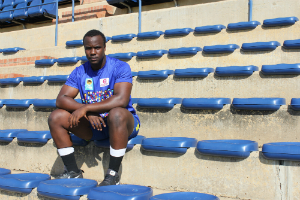
One of the rugby players that Kwenzo Blose looks
up to, is the Cheetah prop Ox Nche. He and Nche
are both residents of the Vishuis men’s residence.
Photo: Jóhann Thormählen
If someone told Kwenzo Blose of Glenwood High School that he would scrum as prop for the South African U/20 rugby team at the Junior World Championship, he would probably have thought it was a joke. At that time he still played lock, but only six months after the shift to prop, he represented his country at the tournament in Manchester, England.
Apart from this, KovsieSport’s Junior Sportsman of 2016 – who will probably be playing in his second World Championship this year, only became a Shimla in 2017. Last year he was still playing for the University of the Free State’s Young Guns.
Beast also played lock at first
André Tredoux, former UFS and Cheetah talent scout, said the Springbok prop Beast Mtawarira also played lock and flank at school. “Glenwood competed in the Wildeklawer Super Schools Tournament. Apparently coach André spotted me there and talked to Stephan Jacobs, another UFS coach. At that stage, I still played lock and they told each other that they had to get me to the Free State and convince me to play prop. I knew nothing of these plans,” said Blose.
According to this Paulpietersburg-native, who is 1,87 m tall and weighs 112 kg, he still has a lot to learn at prop. His greatest adjustments were in the scrums. “At prop you have to absorb the pressure of the rest of the pack in order to provide your team with front-foot ball,” he said. He said Jacobs, who was his Young Guns scrum coach, and Daan Human, the Cheetah scrum doctor, has helped him a lot.
An avid student off the field
Even though rugby has opened doors for the loose head who is studying LLB Law, he maintains a good balance. “The main reason why I came to university is to study. To be playing rugby and performing well is a great blessing, but I also have to prioritise and make sure that I obtain my degree.”
This year’s Junior World Championship was from 31 May to 18 June in Tbilisi, Georgia. Last year, the Baby Boks finished in a disappointing fourth place, but Blose believes they can improve on this. “If everything goes according to plan and if some of the guys are playing again, we would have something like nine players who played in the 2016 tournament.”